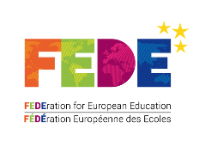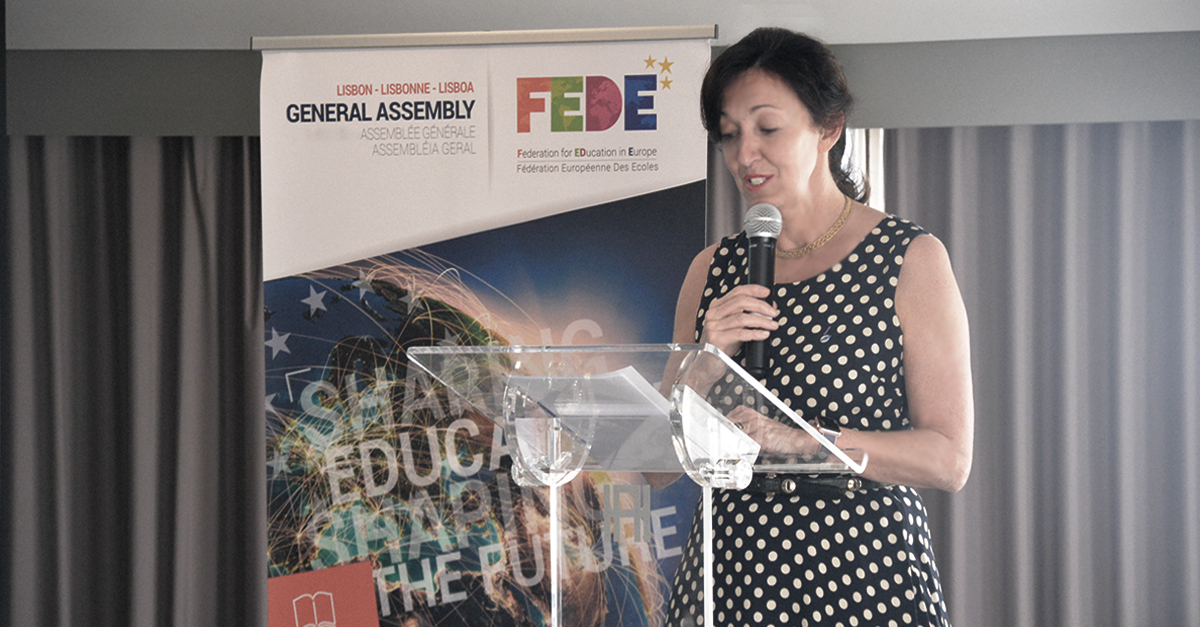Ladies, Gentlemen, Dear Members, Dear Friends,
There are moments, like this conference, where ideas are expressed and where projects take on meaning. I would like to especially thank Mr Dennis Gash, President of IACBE, for his presence.
For 18 months, I have had the pleasure of ushering a new dynamic for the FEDE.
A FEDE on the move, consistently growing internationally, consistently brimming with new ideas and ambitious projects.
Our associative structure, thanks to a federative spirit, bears a globally-oriented project that embraces the values of Europe, that transcends national borders with respect to higher education, that contemplates the supranational as a new frontier, that believes in academic research and views knowledge as universal.
Our project consists “of accomplishing”, “of initiating” and “of acting” on a global scale, of enthusiastically building a humanistic and sustainable project, a project to serve the youth, with humility and conviction.
Bearing a project for the youth is enabling the new generations to cast a lucid outlook on our societies; it is enabling the young people to play an active role in change; it is also ensuring that, every now and then, they are in a position to unsettle and challenge us.
Serving the youth is being the guarantors of transmitting the values that unite and drive us: the values of progress, of peace, of tolerance, of openness, of Human Rights and citizenship.
Choosing Lisbon to gather together ultimately became the manifest option.
It is the choice of a city of history and tradition, of modernity and culture, of intermingling and openness.
It is the choice of a young and vibrant European capital, turned resolutely to its tomorrow. A capital that does not forget its history and which – without overlooking or disowning its history – establishes the future as its constant frontier.
This city that has maintained its illustrious pioneering spirit, the one that traced its greatness, the one that built its renown, the one that has (in part) influenced our current world by introducing abounding prospects and enabled abounding exchanges.
Choosing Lisbon is choosing a city that is unlike any other, a city that welcomes modernity and renewal with joy and appetency, a city that opens up to new ways of doing and thinking, a capital that considers progress as propitious.
A city that is a reflection of the new FEDE. A capital that echoes its project.
My Dear Friends, I am pleased to welcome you this morning to the plenary of our General Assembly, which brings together over 50 institutions involved with the life of our Federation, 50 institutions from close to 17 countries: from Ireland to Belgium, from Spain to Switzerland, from France to Côte d’Ivoire, from Romania to Burkina Faso, from Great Britain to Morocco, from Senegal to Algeria, without forgetting Germany, the Republic of the Congo and China.
I am delighted to associate you to this plenary assembly, which is, as you know, a major forum of the Fédération Européenne des Ecoles, Federation for Education in Europe.
A Federation that leans on its 54 years of existence and which this year celebrates its 30 years of contributions at the Council of Europe. The FEDE is a powerful network of over 180,000 graduates who draw on its geographical anchoring in 33 countries across 4 continents.
As you have noticed over these past months, the FEDE is reinventing and modernising itself; it is turned to the future and has set a network momentum, particularly through the Academic Dating.
A network that is united as well through the advocacy of a civic project and guarantor of the independence of higher and professional education institutions.
A project that offers international harmonisation of training programmes in order to facilitate mobilities and exchanges everywhere and for everyone.
A project that believes in Europe, a Europe of stability, solidarity and peace. And at a time when doubts persist over our Europe, the FEDE emerges more than ever as a model of success.
A project that has confidence in the future and which seeks to claim its rightful place therein.
This plenary assembly will, first and foremost, provide the opportunity to present the actions undertaken in 2016 by Jean-Luc Collet and to outline prospects for 2017 and beyond.
Let us bear in mind that 2016 was a pivotal year for the FEDE’s project and its development.
The accounts of our organisation have become stable, healthy and transparent once again, and I delight in this particularly.
New competent, dynamic and enthusiastic associates have joined the FEDE project. I am glad that they fully apply their energy and I would like to take this opportunity to extend to them my warmest gratitude.
56 new institutions joined the network in 2016. From Spain, Belgium, Great Britain, Ireland, Switzerland, France, China, Guinea, Morocco, Côte d’Ivoire, Mali, Congo and Senegal.
In 2016, the FEDE, keen on the values of excellence and innovation, created a Research Institute and a doctoral school.
The pedagogical development of the FEDE also experienced remarkable dynamism with close to 30 new FEDE European diplomas and certificates created. The FEDE’s marketing and communication outfit was entirely overhauled. A new image has emerged, an impetus has been launched, and I will be happy to later discuss with you on the new marketing, communication and promotional tools of the FEDE.
We embarked on 2017 with a new identity, one that sums up our project and backs its ambitions: “Sharing Education, Shaping the Future”.
“Sharing Education”, is the networks, the partners, the friendship between schools.
“Shaping the Future”, is the children, the society that we wish to build and transmit.
My Dear Friends, this plenary assembly is also the opportunity to map out a direction for the developmental projects for 2017 and I hope well beyond. And, trust me, they are many, they are solid and they are useful!
1) They mainly seek to reinvent our tools and services at your disposal.
You know this better than anyone, the higher and professional education sector is undergoing deep-seated changes, which I am not going to touch on here, I will only quote one word … The MOOCs… Access to knowledge is no longer difficult. It is available everywhere in quantity and quality.
New stakes, new demands, new challenges are emerging:
• The academic excellence of the courses,
• The prominent position research now holds,
• The internationalisation of pedagogical paths,
• The acknowledgement of diplomas by economic stakeholders,
• The major role played by accreditation,
• The inherent professional dimension of training programmes and its various implementation modalities.
The FEDE wishes to play an active role in these changes and support its member schools.
Later, I will present to you the new FEDE tools and services, tools adapted to the needs of each school, everywhere in the world, in support of their development.
2) Among the projects for 2017, we wish, even more, to focus on developing the network and especially internationally.
We are expanding the number of countries represented. Already, this first quarter saw the arrival of a new country from the European Community: Albania, with a private university counting over 4000 students.
We will seek out new, prestigious international institutions with you, as you are the best ambassadors of the FEDE.
It is my wish that in the medium-term, the General Assembly of the FEDE serve as a global platform for networking between schools, a place for working and a genuine agora for higher education which will facilitate bilateral agreements, exchanges and mobilities, with equal concern to students, lecturers or even pedagogical staff.
3) In 2017, we shall place employment and entrepreneurship at the heart of our activities and our missions.
We shall launch this afternoon, with Dominique Amirault, 2017 FEDE Great Witness, President of the Federation of Entrepreneurs and Companies in France, the European Careers and Trades Observatory. And further, we shall invent this new educational model: The Enterprise at the heart of schools.
This observatory will enable us to anticipate changes and the emergence of new professions – and therefore to adapt our training programmes, which, as a reminder, have never been challenged, as the skills acquired by the students are operational and particularly valued by companies.
This observatory will serve as a vast international forum for exchanges, meetings and dialogue between FEDE schools, FEDE students and local, European and international companies.
More than ever, it is my desire that the FEDE supports its member schools in their prime mission, of which I am sure some of you work on daily: the employability of our students and the pride of successful studies.
4) Lastly, in 2017, I would like us to create more links. Together. To take the time to meet with each other in a privileged manner: FEDE team, FEDE schools, FEDE lecturers, FEDE associates and FEDE students. Because we cannot conceive an innovative FEDE without experiencing the schools’ day-to-day activities. Because the schools themselves cannot participate in the FEDE dynamic without knowing its activities and the significance represented by the community of 200,000 FEDE people on a daily basis!
My Dear Friends, before I give the floor to Jean-Luc Collet, General Secretary of the FEDE, I would like to extend to you my warmest gratitude for your presence at this General Assembly and I would like to say before you that all of us, with the team of FEDE employees, with the external expert associates, with the members of the Committee and the Executive Council, we apply all of our energy and our commitment to serve the development of our Federation.
That with ethics and strength, ambition and energy, we believe above all in the project that unites us, a project at the service of progress for Education.
That we are and will always be at your disposal, as the ideas, the energies and the projects emerge where knowledge is experienced.
That the strength of the youth is the capacity to dare.
That our mission is to enable it.
I wish you all a wonderful assembly!
Claude Vivier Le Got, FEDE Chairwoman and Chairwoman of the Education & Culture Committee of the Conference of INGOs of the Council of Europe.

